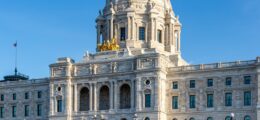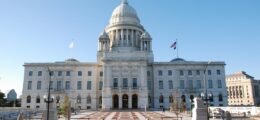May 23, 2024
Minnesota 2024 Legislative Session Recap, Vol. 1
The 2024 Minnesota Legislative Session came to a chaotic conclusion for the year at midnight on Sunday, May 19.
The final week of a legislative session is typically messy. As time gets short and the “priority” list grows, the minority caucuses gain more power over what happens on the floor. Lengthy debates and amendments make it increasingly difficult for the majority caucuses to manage time and pass their key legislation.
This session was no different, with a few big exceptions. Democrats and Republicans couldn’t agree on much, and lengthy debates on critical issues like Paid Family and Medical Leave often dragged on until midnight or later every day.
Unlike past years, however, the parties could not come together on a bipartisan agreement about how to end the session. Usually, the majority makes concessions to the minority (e.g., a handful of bills that will not pass) in order to gain agreement on limiting debate.
That didn’t happen this year, and the time crunch got worse as the Minnesota Senate took a 10-hour recess on the second to last day. The Minnesota House wasted hours on a bill that would allow cities across the state to adopt “Ranked Choice Voting” for all elections, which failed on a vote after three Democrats joined Republicans in opposition.
With unpassed bills piling up on the last day, the majority piled them all into a single, 1,400+ Mega Omnibus Bill and passed it in the last hour on Sunday. Neither the public nor lawmakers had an opportunity to read the bill, as it was not printed or available online.
In addition to a small tax bill that mostly focused on the child tax credit and mineral tax distributions, the 1,400-page Mega Omnibus Bill included a lengthy list of unrelated legislation:
– HF 5242 (Transportation, Housing, Labor)
– HF 4247 (Scope of Practice)
– HF 4024 (Higher Education)
– HF 2609 (Straw purchase/binary trigger ban)
– SF 4942 (Agriculture/Energy)
– SF 5335 (Human Services)
– SF 4699 (Health & Human Services)
– HF 5363 (Paid Family Leave)
Some Capitol observers have already speculated about a legal challenge to the bill’s constitutionality based on the Minnesota Constitution’s Single Subject Rule (Art. 4, Sec. 17). This rule states that “no law shall embrace more than one subject” and has been the basis of successful challenges to absurdly overweight omnibus bills in the past.
However, Minnesota Courts have taken varying approaches to interpreting this rule over time. For instance, a court signed off on the inclusion of an obscure financing mechanism to pay for the $100 million Minnesota Senate Building in the 2013 Tax Bill.
Small Business Victories
The ugly end of session brought a mix of outcomes for small businesses, but NFIB Minnesota helped secure some key victories for Main Street:
YES to Tax Fixes That Mean Tax Savings: Inadvertent errors in the 2023 Tax Bill put tax deduction savings in jeopardy for individual and business filers. Last year’s bill included incorrect effective dates, which would’ve reduced the value of deductions in a way that lawmakers did not intend.
NFIB supported fixing these errors, which would’ve cost individual filers $350 million per year. Additionally, 4,850 taxpayers will save an average of $3,050 on the one-year delay in the reduction of the Net Operating Loss deduction (from Tax Year 2023 to Tax Year 2024).
NO Full-Time Legislature Amendment: NFIB members mobilized against this three-part proposal to change our state constitution. One provision would have allowed the Minnesota Legislature to meet year-round, a dangerous proposition for those who believe taxes and regulations are already bad enough here.
Through action alerts and newspaper op-eds, we got the attention of the public and lawmakers. This proposal didn’t get approved in either chamber of the legislature.
NO $20/Hour Statewide Minimum Wage: NFIB pushed back hard on this absurd piece of legislation and, fortunately, it did not become law. The proposal would’ve raised the statewide minimum wage to $15/hour by August 1, 2024, then to $20/hour in 2028.
Recent reports by the Minneapolis Federal Reserve showed devastating impacts in the retail and hospitality industries due to the $15/hour minimum wages in Minneapolis and St. Paul. These policies left both small businesses and workers worse off, and highlighting the Federal Reserve’s work was key to killing the statewide proposal.
NO Unemployment Checks for Striking Workers. DFL lawmakers proposed allowing striking workers to get unemployment checks from nearly day one of a labor dispute. NFIB members sent a strong message against this bad policy and we were successful in blocking it this year.
UI checks for strikers uses the power of government to tip the scales in favor of workers during a strike. It removes a big incentive (loss of income) for compromise and would raise taxes on the affected employer through a higher UI experience rating.
NO Painter’s License Bill: Early in session, the Senate looked like it would move quickly on a bill to establish a new occupational license for anyone that does residential or commercial painting for hire, as well as set up a Paint Contractor Board to pile on more restrictions. The bill also would’ve required a license for anyone who wanted to buy more than a gallon at a time of oil-based paint, solvent, or other solvent-based materials.
NFIB MN pushed back hard, with members delivering powerful messages to lawmakers. Together with other industry-focused groups, we were able to stop this proposal.
NO Health Insurance Claims Assessment Tax. This proposal would have raised taxes on your healthcare by around $650 million per year. It did not advance in either chamber.
NO Government-Run Health Insurance. Many DFL lawmakers wanted to move forward with a government-controlled “public option” for health insurancev. This scheme involves the government designing its own health insurance product and competing with private companies in the market.
The government plan would be a Cadillac policy at Datsun prices. If that seems too good to be true, it is. The government plan is heavily subsidized with taxpayer money – likely through higher taxes on healthcare services – and low payment rates to clinics and hospitals.
The latter is a hidden tax on those with private health insurance coverage, as low payment rates for government plan coverage will be offset by higher prices on those with private commercial insurance. It also puts rural healthcare providers, many of whom are already on the financial brink, in further danger of closing their doors.
NFIB worked with a large coalition to stop this reckless piece of legislation. In April, we published an op-ed explaining the problems in the Star Tribune that received positive feedback from legislative Democrats and Republicans alike.
NO Trial Lawyer Giveaway: Plaintiffs’ attorneys sought major changes to how liability is determined in court proceedings. This would have substantially increased insurance costs and financial risks for everyone from construction contractors to restaurant owners.
Significantly, trial lawyers were seeking to allow double recovery in liability cases and to allow plaintiffs to shift financial burden from at fault parties without financial resources to at fault parties who can pay, even if the latter party is significantly less at fault than the non-paying party. This would’ve been a magnet for lawsuits against small businesses.
NFIB worked with industry leaders and through the Minnesotans for Lawsuit Reform to stop the worst of this proposal.
—–
This is the first in a series of recaps on the 2024 Minnesota Legislative Session. In future editions, we’ll focus on new mandates and regulations that small business owners need to know about.
NFIB is a member-driven organization advocating on behalf of small and independent businesses nationwide.
Related Articles














